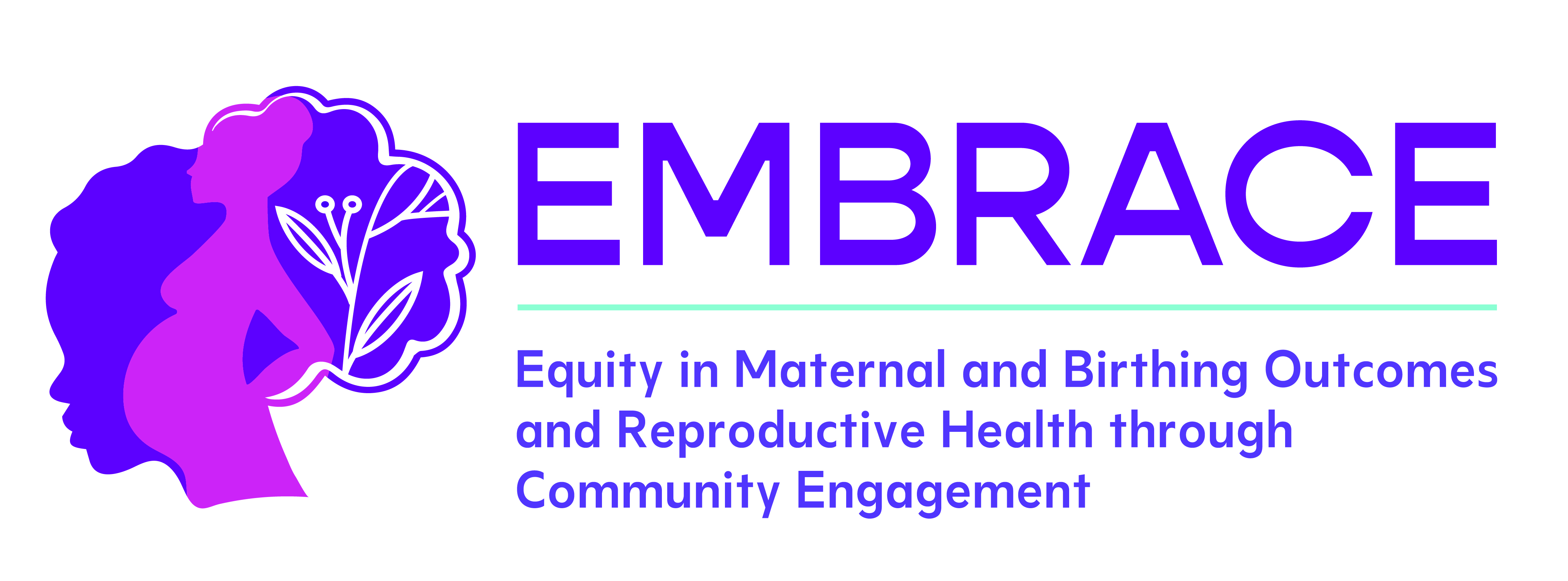
EMBRACE
University of Pittsburgh
The Equity in Maternal and Birthing Outcomes and Reproductive HeAlth
through Community Engagement (EMBRACE) Center of Excellence brings together existing maternal health partners in Allegheny County, Pennsylvania and surrounding regions to evaluate, co-develop, and implement a community-informed postpartum care model.
EMBRACE aims to develop an innovative model of postpartum care for Black birthing patients, a group with exceptionally high rates of severe maternal morbidity and maternal mortality because of structural and interpersonal racism, social determinants of health, and inadequate healthcare delivery. EMBRACE will leverage community and training resources develop and implement a new, integrative model of postpartum care that is culturally- and community-informed.
EMBRACE uses BIRTH (Battling Inequities & Realizing Transformational Health Outcomes) Plan for Allegheny County as a blueprint through four key areas:
- Strengthening the Maternal and Child Health Workforce
- Strengthening Systems of Care
- Addressing Social Determinants of Health
- Coordinating and Streamlining Maternal and Child Health Initiatives

University of Pittsburgh
Contact
-
Co-Principal Investigator (Co-PI): Dara Daneen Mendez
-
Co-PI: Hyagriv N Simhan
-
Co-PI: Mehret Birru Talabi
-
Contact Us

At a Glance
1
Research Project
15+
Community Partners
Research Topics- Racial equity
- Systems of Care
Status
Research activities started
Overarching Aims
Advance interdisciplinary research guided by Reproductive Justice principles and Public Health Critical Race Praxis.
Develop, implement and evaluate multi-level interventions.
Implement a new postpartum care model across five Pittsburch IMPLICIT sites.
- Assess training, implementation, and clinical and person-centered outcomes
- Pilot an unconditional cash transfer that mirrors a 2-month paid family leave with 30 postpartum participants. Assess feasibility, acceptability, and use of funds.
Research Project Details
Developing a Community-informed model of 4th trimester (4TM) and Interconception Care (ICC)
This research project will begin by evaluating clinical and person-centered outcomes among recipients of the 4TM/ICC intervention at the Interventions to Minimize Preterm Birth and Low Birthweight Infants through Continuous Quality Improvement (IMPLICIT) sites matched with a comparison group. IMPLICIT is a family medicine maternal child health multi-site learning collaborative focused on improving birth outcomes and promoting the health of women, infants, and families through innovative models of care, quality improvement and professional deelopment for current and future physicians. Based on these results, qualitative focus groups will inform the co-development of a postpartum care model to improve perinatal health outcomes and well being among Black birthing women. The third piece of this work will involve implementation of this new model across new sites.
Key Maternal Health Indicators: Pennsylvania
-
126,951
live births in 2023 1
-
31.3%
of births were cesarean deliveries 1
-
9.7%
of births were preterm 1
-
35.2%
of deliveries were covered by Medicaid 1
-
1,049
women with life-threatening complications per every 100,000 births 2
-
23.7
women die from pregnancy complications per every 100,000 births 3
-
1.9x
White women were 1.93 times more likely to die from pregnancy complications than Black women 3
-
Top-3 causes
of pregnancy-related deaths: mental health conditions (including substance use disorders), embolism, and cardiac and coronary conditions 3
-
12.4%
of women are without a birthing hospital within 30 minutes 4
-
74.6%
of birthing women start prenatal care in the 1st trimester 1
Partner Organizations
EMBRACE will provide community-partnered research, practice, and intervention education and career development for all reproductive and perinatal health partners, including investigators, clinicians, birth workers, data scientists, community leaders, and investigators.
- Healthy Start
- Allegheny County Health Department
- Black Women's Policy Center
- Midwife Center
- Allegheny Health Network
- Magee-Womens Research Institute
- The Center for Health Equity at the University of Pittsburgh School of Public Health
- University of Pittsburgh School of Public Health
- The Center for Innovative Research on Gender Health Equity (CONVERGE@ Pitt)
- University of Pittsburgh Medical Center
- University of Pittsburgh School of Medicine
- University of Pittsburgh School of Nursing
- University of Pittsburgh School of Health and Rehabilitation Sciences
- University of Pittsburgh School of Education
"We are thrilled to build upon ongoing maternal and reproductive health equity and justice research and initiatives in the Pittsburgh region by launching EMBRACE,” said Dr. Dara Mendez. “Black communities disproportionately experience adverse pregnancy and birth outcomes, particularly in our region; and it is critical that we center those same communities in our work."

References
- Data are from 2023 live births occurring within the US to US residents. Cesarean deliveries are the percentage of live births where the final route and method of delivery was cesarean. Preterm births are the percentage of live births where the gestational age at birth was less than 37 weeks. Medicaid coverage is the percentage of live births where the source of payment for the delivery hospitalization was Medicaid. Prenatal care in the 1st trimester is the percentage of live births where the first prenatal appointment occurred between the 1st and 3rd month of pregnancy.
Source: Centers for Disease Control and Prevention, National Center for Health Statistics. National Vital Statistics System, Natality on CDC WONDER Online Database. - Life threatening complications are deliveries with a diagnosis or procedure code indicating severe maternal morbidity. Information reported for 2022.
Source: Agency for Healthcare Research and Quality, Healthcare Cost and Utilization Project, State Inpatient Databases 2010 to 2021. - Information is based on pregnancy-related deaths in 2020. Pregnancy-related deaths include deaths during or within a year of pregnancy from causes related to or aggravated by the pregnancy or its management.
Source: Pennsylvania Department of Health. 2024 Pennsylvania Maternal Mortality Review Annual Report, Deaths occurring in 2020. - March of Dimes Maternity Care Deserts Report 2023.

